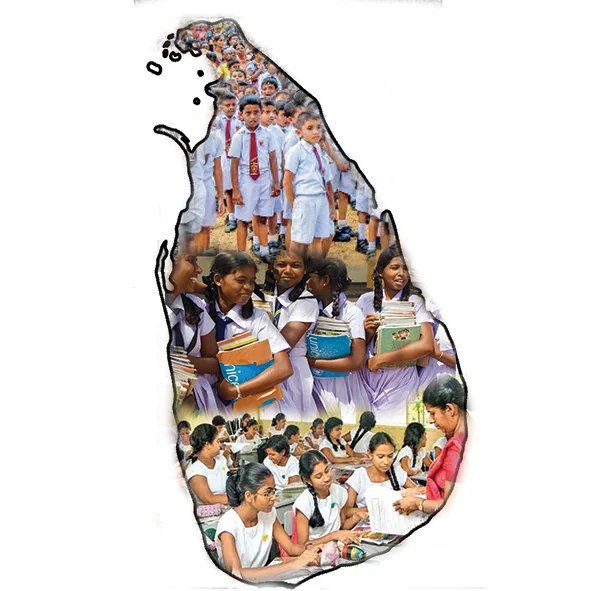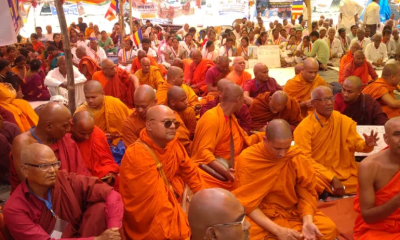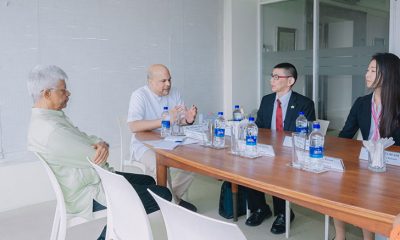Opinion
Venturing into health tourism and unlocking a world of benefits for Sri Lanka!

by Dr. Gotabhaya Ranasinghe
Sri Lanka is blessed with natural resources and scenic beauty. Famed for the hospitality of the friendly people, the country has a lot more to offer than just delicious food, comfortable lodgings, adventurous nature trails, and the green-blue seas.Sri Lanka is facing a grave financial crisis, of which the repercussions are viciously experienced by many citizens. Its inability to bring in enough foreign exchange has exacerbated its woes.
How can we as medical professionals help the country during a forex crisis? Besides the short and medium-term plans that encourage many foreign donations to the country, shouldn’t we also look for a long-term plan to revive the economy?
Sri Lanka has one of the best education systems in the world and produces skilled professionals to many industries. Sri Lanka’s medical professionals are considered to be highly skilled, and I, as a medical professional myself, feel that there are endless possibilities for us to serve the country if the right opportunities are created.Tourism is a major forex earner, but what about health tourism, which is one of the largest growing segments of wellness and medical tourism?
What is health tourism?
Health Tourism allows people to travel to different countries to receive health services to increase their quality of life, enabling them to improve their physical and mental well-being.
Health tourism allows you to engage in activities, treatments, and therapies that benefit your health and contributes to a healthier physical, mental, and spiritual health.
Why is health tourism becoming a popular segment?
Affordable treatment
Professional health services
Long waiting lists in countries of residence
Insurance coverage-related matters
Benefits of native treatment
Confidentiality
Combination of treatment with holiday
Faster recover in a different environment
Availability of best and professional care / personalised care
Better access to technology and specialists
Availability throughout year
What are the benefits of health tourism?
It’s the perfect gateway for tourists to receive high-quality healthcare at affordable prices.
Why should Sri Lanka contribute to creating a health tourism segment?
Health tourism is a growing industry. The global pandemic (covid-19) made people more cautious and aware of their health, and they are keen and make health and well-being a top priority. People are on the lookout for affordable holiday destinations and combine therapy, treatments, and access to medical procedures that may sometimes be unavailable in their residing country.Sri Lanka is a well-known holiday destination and it is easy to attract tourists who seek the bliss and comfort of health tourism.
Our country possesses skilled and specialised medical professionals who are:
Reliable and possess the required language skills
Empathetic and well-trained to care for patients
Comparatively cheap labour than European countries
Comparatively cheaper overhead costs and expenses
The ability to furnish patients with comfortable lodgings
Sri Lanka is a tropical country and the warm & sunny weather is known to be immensely beneficial for our health.
What treatments can we offer?
Cardiology
ENT treatment
Eye surgery
Dental/dentistry
Dermatology / Cosmetic/plastic surgery
Orthopaedics
Bariatric surgery
Transplants
Fertility treatment
Native treatment, oil therapies, and access to alternative treatment
Spa therapy
Medication and yoga centers
Rehabilitation
Weight loss or healthy eating retreats
What is stopping us?
I must frankly admit that to cater to the health tourism sector, the state-runt hospitals may need more time to undergo improvements such as patient-friendly lodgings and environment. This might seem a difficult task at a time like this due to lack of funds, but the private hospitals and treatment centers are equipped to engage in health tourism.With some innovative thinking, the private sector is capable of catering to professional health tourism industry.
What we are capable of offering!
Highly specialised medical professionals and well-trained staff
Internationally accredited, state-of-the-art medical facilities
Personalised care – The comfort and the convenience of a private room, interpreter & support staff while receiving treatment and other tailor-made services designed for the patient’s comfort.
Round-trip-travel-support. Teams can offer services from medical treatment to travel assistance to a hotel of the patient’s choice, reservation assistance, visa procedure, etc.,
Significant cost reductions for the international patients Immediate access to treatment – no waiting lists
Aftercare programmes
A change of attitude will make us ready to serve a wider community!
No matter how skilled or specialised our professionals are, there are a few obstacles we are yet to overcome for us to open the country to health tourism. We need to get together as a team and turn a new leaf.
1. The country should introduce a simple visa procedure and allow hassle-free entry for the visitors.
2. Over the years as a medical practitioner, I have noticed that the private hospitals in Sri Lanka don’t quite meet the required standards and quality of patient care. I sometimes wonder if the private sector is far too commercialised and concerned only about earning money and not patients’ welfare. Are the medical support staff trained and experienced enough to care for patients, and to assist with their wants and needs? Are the patient rooms comfortable and clean? Does a patient have complaints about the available facilities even after paying money to obtain services? The specialised skilled services surely require to be more structured and organized.
3. Of course, I understand that private hospitals are profit-oriented commercial ventures. But, are they utilising their profits for the benefit of the patients? Some private hospitals are not equipped with modern or advanced technology on par with standard treatments, especially when it comes to cardiology and perhaps in other areas too. Shouldn’t we address this issue as a national priority? Our private hospitals need improvement in comparison with neighboring countries like the Maldives, India, Singapore, etc., engaged in health tourism.Dr. Gotabhaya Ranasinghe, Consultant Cardiologist, Institute of Cardiology, National Hospital of Sri Lanka
I kindly urge relevant tourism authorities, the Ministry of Health, medical professionals, and private health caregivers to consider these views and create opportunities to implement a growing and nourishing health tourism sector in Sri Lanka to enhance the inflow of foreign exchange.Dr. Gotabhaya Ranasinghe, Consultant Cardiologist, Institute of Cardiology, National Hospital of Sri Lanka.
Opinion
Learning from global models to address flooding and water shortage in Sri Lanka

by Sudharman Siripala
Sri Lanka is grappling with the increasing threat of climate change, which has led to unpredictable weather patterns. The country faces a dangerous combination of flooding in some regions and water shortages in others, a situation exacerbated by shifting rainfall patterns. Rivers originating in the Central Hills, such as the Mahaweli, Kalu, and Kelani, flow through much of the country, but these water sources are not being distributed evenly. Districts like Monaragala and Hambantota, located in the dry zone, are experiencing severe water shortages. To address this challenge, experts suggest the development of an interconnected river system to harness excess water during floods and redirect it to drier areas, ensuring a year-round water supply for agriculture and daily use.
Global Case Studies in River Management
Several countries facing similar water-related challenges have implemented successful water management systems that Sri Lanka could adapt to its unique circumstances:
The Netherlands – Room for the River Programme
The Netherlands, a country prone to flooding, widened its rivers and relocated dikes to create floodplains. This approach allows rivers to overflow without damaging urban areas, while preserving water flow and natural habitats. Sri Lanka could apply this concept by designating specific riverbank areas for temporary flood storage.
China – South-North Water Transfer Project
China’s massive project channels excess water from the flood-prone Yangtze River to drier northern regions. This system of canals and reservoirs could inspire Sri Lanka to divert water from rivers in the Central Hills to drier areas in the south and east.
Bangladesh – River Interlinking Projects
Bangladesh has implemented river interlinking projects to redistribute water from flood-prone rivers, such as the Brahmaputra, to drier regions. Sri Lanka could link its major rivers like the Mahaweli and Kelani to smaller rivers in water-scarce districts to balance water distribution.
India – National River Linking Project
India’s National River Linking Project connects major rivers to manage both floods and droughts. Sri Lanka could use similar strategies, connecting rivers around the 500-foot contour line in the Central Hills to help distribute water more effectively.
United States – Mississippi River and Tributaries Project
The Mississippi River system combines levees, floodways, and diversion channels to manage flooding. Sri Lanka could adopt similar flood-control measures in vulnerable river basins such as the Kelani and Kalu.
Japan – Underground Reservoirs and Flood Channels
Japan’s G-Cans Project in Tokyo channels excess water into underground reservoirs to prevent urban flooding. A similar underground system could be implemented in Colombo and other flood-prone cities in Sri Lanka.
Singapore – Marina Barrage
Singapore’s Marina Barrage serves as both a flood control measure and a water supply resource. Sri Lanka could develop similar systems to control flooding in urban areas and ensure water availability during dry spells.
Thailand – Chao Phraya River Basin Management
Thailand uses diversion channels in the Chao Phraya River Basin to prevent flooding in Bangkok and direct water to agricultural areas. Sri Lanka could replicate this by creating diversion channels to supply water to its agricultural zones.
Actionable Solutions for Sri Lanka
Develop an Interconnected River System
Establish water diversion channels along the 300-500 meter contour lines of the Central Hills to capture excess rainfall during floods and redirect it to drier areas.
Build Reservoirs and Storage Tanks
Construct reservoirs to store diverted water, ensuring a steady supply for agriculture and domestic use. Sri Lanka has around 14,000 ancient tanks out of 30,000 that could be revitalized for this purpose.
Improve Urban Flood Defenses
Drawing inspiration from Japan and Singapore, build underground reservoirs and flood channels in cities like Colombo to mitigate urban flooding.
Strengthen Watershed Management
Restore natural floodplains and create wetlands to absorb excess rainwater, as seen in the Netherlands, helping to reduce flood risks.
Encourage Public-Private Partnerships
Foster collaboration between the public and private sectors to fund large-scale water management infrastructure, leveraging models from China and the United States.
Leverage Technology
Utilise modern forecasting and real-time water management systems, similar to those in Bangladesh and Thailand, to monitor water levels and manage river flows dynamically.
International Collaboration
Form partnerships with countries that have successfully implemented flood control and water management systems to share expertise and technology.
Sri Lanka’s dual challenges of flooding and water scarcity, compounded by climate change, require immediate action. By developing an interconnected river system and learning from successful global water management models, Sri Lanka can mitigate the effects of floods while ensuring a sustainable water supply for agriculture and daily life. It is crucial for the country to act now, as these solutions have the potential to transform Sri Lanka’s water management system for the better.
Sudharman Siripala Managing Director of Geoinformatics Group and a Registered Licensed Surveyor, specializes in geo-spatial applications. He also serves as a freelance value chain consultant for Vivonta Green Tech Consultants (www.vivonta.lk)
Opinion
Doctor’s plight

Some people have found fault with a female doctor for not coming forward to identify her rapist and help make him pay for his crime.
Do they not realise the emotional toll of facing her rapist again?
There should be a way for survivors to testify directly to the judge without enduring such distressing encounters. Making a victim relive her trauma in this manner is akin to subjecting her to the ordeal all over again.
A Ratnayake
Opinion
Developing attitudes of schoolchildren for development

Sri Lanka was once at an economically comparable level with some of the world’s most developed countries in the 19th century. However, despite our country’s potential, we are still striving to fully develop. Many people often blame politicians, government officers, or various sectors for the situation. However, I believe the root cause of these issues lies not in any individual or group, but in the lack of good attitudes within our society.
We are investing significant resources into our education system, which is funded by the taxes of hard- working citizens. However, when we examine the outcomes, we realise that the academic achievements of our graduates alone are not enough. There are instances where professionals, despite having the necessary qualifications, fail to uphold ethical standards. In some cases, this even results in malpractice or harmful actions that damage our country’s reputation and progress. This highlights the gap between academic success and real-world responsibilities.
The education system, which is currently focused on competitive exams and rote learning, does not emphasise the development of attitudes and character in students. While our students are academically capable, many lack the qualities required to contribute positively to society. This lack of focus on social values, such as patriotism, selflessness and respect for elders, is holding us back from achieving the level of progress we deserve.
To address these concerns, I wrote to His Excellency, the President of Sri Lanka, on 24th September 2024, proposing education reforms that emphasise not only academic qualifications but also attitudes, ethics, and social responsibility. I suggested a holistic approach to university admissions and government recruitment, incorporating moral integrity, character, and extracurricular involvement, key traits for fostering well- rounded, responsible citizens. More importantly, I strongly recommended introducing a compulsory school subject, with both theory and practical components, focused on attitude development, which would be evaluated in university admissions. Encouraging extracurricular participation alongside academics will help shape ethical and socially responsible individuals.
I am pleased to inform you that the President, recognising the importance of these reforms, has directed the relevant ministries (by a letter dated 24th October 2024) to explore integrating these ideas into the education system. This marks a crucial step in transforming the values and attitudes of our youth for the nation’s benefit.
However, meaningful change requires collective effort. Parents, teachers, students, and citizens all play a role in shaping Sri Lanka’s future. Together, we must instill responsibility, ethics, and patriotism in the next generation. I invite you to share your thoughts and suggestions on further enhancing the values and attitudes of our youth. Your feedback will be invaluable in building a brighter future for Sri Lanka, one driven not just by knowledge, but by integrity and character.
Dr. Mahesh Premarathna
Research Fellow, National Institute of Fundamental Studies, Sri Lanka Email: mahesh.pr@nifs.ac.lk
-

 News7 days ago
News7 days agoSeniors welcome three percent increase in deposit rates
-

 Features7 days ago
Features7 days agoThe US, Israel, Palestine, and Mahmoud Khalil
-

 News7 days ago
News7 days agoScholarships for children of estate workers now open
-

 Foreign News5 days ago
Foreign News5 days agoBuddhism’s holiest site erupts in protests over Hindu ‘control’ of shrine
-

 News7 days ago
News7 days agoJapanese Defence Delegation visits Pathfinder
-

 Features4 days ago
Features4 days agoCelebrating 25 Years of Excellence: The Silver Jubilee of SLIIT – PART I
-

 Editorial6 days ago
Editorial6 days agoWhen tractors become cars!
-

 Business2 days ago
Business2 days agoAIA Higher Education Scholarships Programme celebrating 30-year journey











